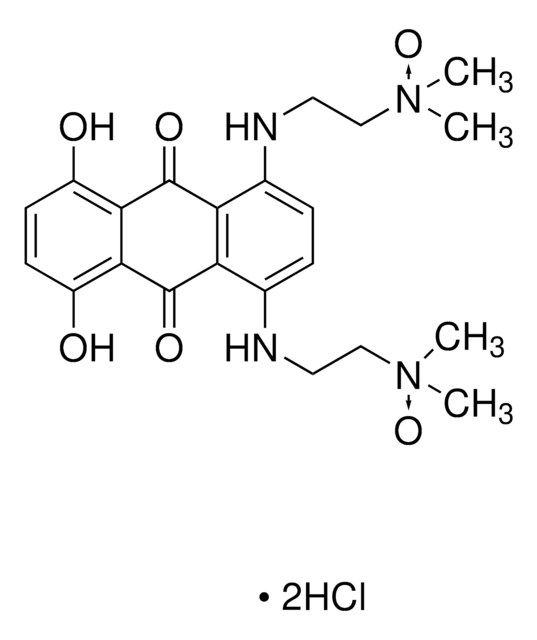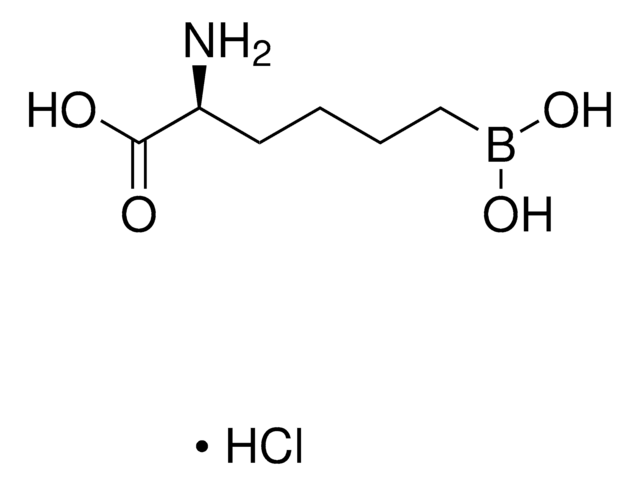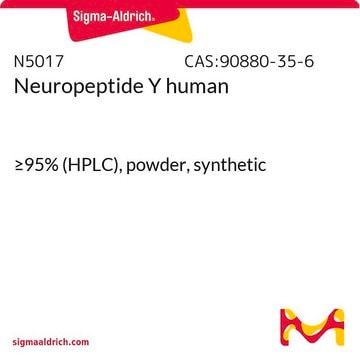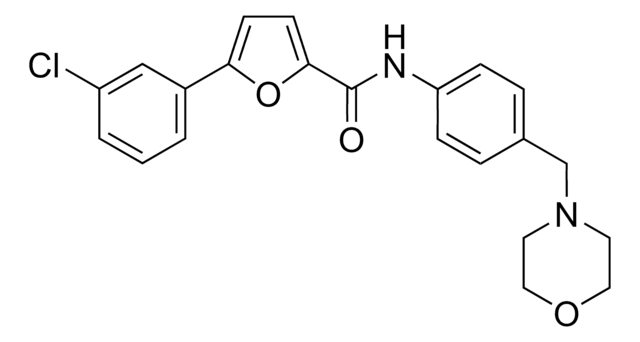SML0668
Calhex 231 hydrochloride
≥98% (HPLC)
Synonym(s):
4-Chloro-N-[(1S,2S)-2-[[(1R)-1-(1-naphthalenyl)ethyl]amino]cyclohexyl]-benzamide hydrochloride
Sign Into View Organizational & Contract Pricing
All Photos(1)
About This Item
Empirical Formula (Hill Notation):
C25H27ClN2O · HCl
CAS Number:
Molecular Weight:
443.41
UNSPSC Code:
12352200
NACRES:
NA.77
Recommended Products
Quality Level
Assay
≥98% (HPLC)
form
powder
storage condition
desiccated
color
white to beige
solubility
DMSO: 15 mg/mL, clear
storage temp.
−20°C
Application
Calhex 231 hydrochloride has been used:
- as a calcium-sensing receptor (CaSR) antagonist: to test its impact on hearing in rats
- to test its effect on blood pressure levels spontaneous hypertensive rats (SHRs)
- to test its effect on acoustic response bias in zebrafish
- in Caco-2 cells to test its effect on, overexpression of fibroblast growth factor-23 (FGF-23 )
Biochem/physiol Actions
Calhex 231 is a negative allosteric modulator of the calcium sensing receptor CaSR. Calhex 231 blocks calcium-induced accumulation of inositol phosphate with an IC50 of 0.36 μM.
Storage Class Code
11 - Combustible Solids
WGK
WGK 3
Flash Point(F)
Not applicable
Flash Point(C)
Not applicable
Choose from one of the most recent versions:
Certificates of Analysis (COA)
Lot/Batch Number
Don't see the Right Version?
If you require a particular version, you can look up a specific certificate by the Lot or Batch number.
Already Own This Product?
Find documentation for the products that you have recently purchased in the Document Library.
Toshiya Minakata et al.
Frontiers in molecular neuroscience, 12, 175-175 (2019-08-06)
Maintaining Ca2+ homeostasis in lymphatic fluids is necessary for proper hearing. Despite its significance, the mechanisms that maintain the cochlear lymphatic Ca2+ concentrations within a certain range are not fully clarified. We investigated the functional expression of calcium-sensing receptor (CaSR)
Xin Zhang et al.
Mediators of inflammation, 2019, 6847087-6847087 (2019-03-25)
Increasing evidence suggests that the NLRP3 (nucleotide oligomerization domain-like receptor family, pyrin domain containing 3) inflammasome participates in cardiovascular diseases. However, its role and activation mechanism during hypertension remains unclear. In this study, we tested the role and mechanism of
Kannikar Wongdee et al.
Archives of biochemistry and biophysics, 657, 15-22 (2018-09-16)
Long-term high-calcium intake and intestinal calcium hyperabsorption are hazardous to the body. It is hypothesized that enterocytes possess mechanisms for preventing superfluous calcium absorption, including secretion of negative regulators of calcium absorption and utilization of calcium-sensing receptor (CaSR) to detect
Roshan A Jain et al.
Current biology : CB, 28(9), 1357-1369 (2018-04-24)
Animals continuously integrate sensory information and select contextually appropriate responses. Here, we show that zebrafish larvae select a behavioral response to acoustic stimuli from a pre-existing choice repertoire in a context-dependent manner. We demonstrate that this sensorimotor choice is modulated
Pamela Mattar et al.
International journal of molecular sciences, 21(20) (2020-10-21)
Autophagy is upregulated in adipose tissue (AT) from people with obesity. We showed that activation of the calcium-sensing receptor (CaSR) elevates proinflammatory cytokines through autophagy in preadipocytes. Our aim is to understand the role of CaSR on autophagy in AT
Our team of scientists has experience in all areas of research including Life Science, Material Science, Chemical Synthesis, Chromatography, Analytical and many others.
Contact Technical Service






![Cyclo(7-aminoheptanoyl-Phe-D-Trp-Lys-Thr[Bzl]) ≥95% (HPLC), powder](/deepweb/assets/sigmaaldrich/product/structures/235/466/8e0939d2-d5f9-46ee-ad12-f28fe40c308a/640/8e0939d2-d5f9-46ee-ad12-f28fe40c308a.png)

